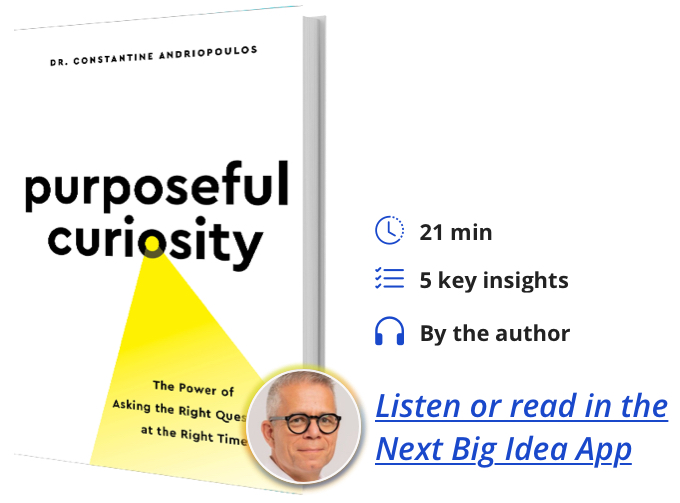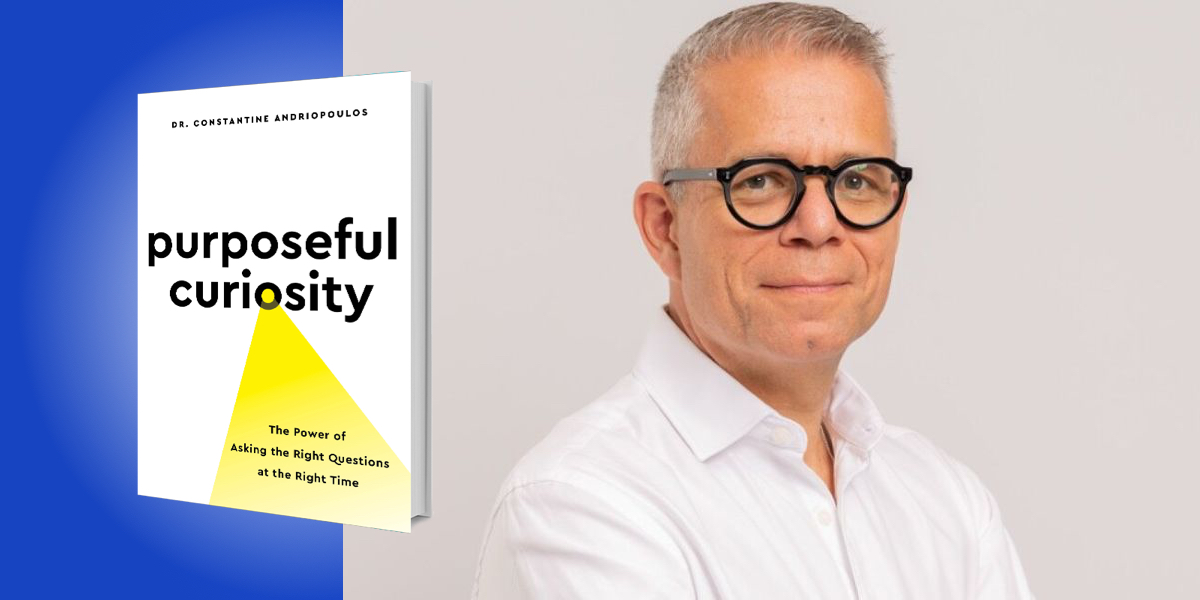Constantine Andriopoulos is a Professor of Innovation and Entrepreneurship at Bayes Business School, in City, University of London, and the Director of Avyssos Advisors, an innovation management consultancy.
Below, Constantine shares 5 key insights from his new book, Purposeful Curiosity: The Power of Asking the Right Questions at the Right Time. Listen to the audio version—read by Constantine himself—in the Next Big Idea App.

1. Uncover your itch and turn it into a project.
On November 20, 2020, Rocket Lab, a leading California-based aerospace manufacturer, launched its Electron rocket, a small reusable rocket. The launch was the brainchild of Peter Beck, an engineer from New Zealand and the founder and CEO of Rocket Lab. Beck’s itch was to figure out a cheaper way to get things into orbit. To do so, he had to figure out ways to bring down the cost of his rockets. While NASA’s rockets can cost up to $1.6 billion to launch, each Rocket Lab small-satellite low-orbit launch, costs about $5 million.
Beck’s fascination with rockets started at a young age. As a teenager, he became curious as to whether he could build one. He started by reading as much as he could about the subject and then began to experiment with different designs in his garden shed. At the age of 18, he strapped a rocket engine to the back of a custom-made bicycle and managed to ride at about a hundred miles an hour. Instead of attending university, he accepted a toolmaking apprenticeship, while at night, he continued to develop his rocket engines. In 2006, he founded Rocket Lab. Like Beck, we should start by focusing on a purpose that gets us up in the morning, and with a conviction that everything is understandable. So how can you ignite that spark?
First, you need to get yourself into the right mindset. You must activate a sense of wonder. Then you need to look for inspiration. Inspiration may come from everywhere. Try asking questions like; What if? Am I sure? What’s next? Have I looked closely enough? Have I looked everywhere?
Then select a topic that interests you enough and that you can pursue deeply for a long time. How do you choose which curiosity journey to follow? Three things make an itch worth focusing on: boundaries, purpose, and belief.
Pushing boundaries is about addressing hard problems, seizing exciting opportunities, or going where no one has gone before. This way, your curiosity journeys will be fuelled by lots and lots of smaller puzzles or mysteries. The purpose must be personal. Be emotionally connected to a worthwhile cause and immerse yourself in it. The belief must be concrete. As a point of departure, believe that everything is understandable or will eventually become understandable, with the help of others.
Then, grant yourself permission to explore. You have fallen in love with your puzzle but wonder if you can pull it off. It is all too easy to think of all the issues that stop us from embarking on a journey. You may have caught yourself thinking about starting projects, and then jumping from idea to idea without getting started. None of us is immune to this approach, but it is impossible to start a curiosity project if we explore haphazardly and butterfly-like. You must take control.
“Don’t wait for others to tell you what to do or confirm that it is OK to start.”
Take ownership of your curiosity project. Don’t wait for others to tell you what to do or confirm that it is OK to start. Grant yourself permission! When you find something that you are passionately curious about, rather than initiating your exploration in private, go public. Declare it to the whole world! Start investing time, energy, and resources. Hand yourself over to your curiosity either gradually, or by going all in.
2. Become an expert fast.
When Marshall Culpepper, the American serial software entrepreneur, founded KubOS with an aim to develop a secure, open-source platform for space-flight software, he had to become an expert quickly. He faced a significant challenge though: he had neither the formal qualifications nor any relevant experience in astronomy. Undeterred by his own naivety and seduced by the business opportunity, Culpepper immersed himself in the science of astronomy. Searching online for insights proved very useful, but what he found particularly beneficial was Coursera’s online course on astronomy and aerospace engineering. Like Culpepper, many people who work nine to five jobs decide to teach themselves new skills, launch a business, or explore a new area of interest. They shouldn’t let their lack of relevant formal qualifications or experience deter them from pursuing their curiosity journeys.
When you are passionate to learn as much as you can about the subject that stirs your curiosity, you can create your own learning environment, set your own learning goals, and plan your own lessons. How do you go about this?
First, establish your framework. Be specific about your learning goals. What do you want to know? Develop a timetable for the subjects that you want to study. Create your schedule and stick to it!
Now create your own curriculum. You have set aside the time you need to study, and you have claimed a distraction-free place for your work. Now comes the hard part, but it is also the fun part: Gather the resources you require to fulfil your curiosity. The internet has excellent resources, but be disciplined. Before you run every conceivable search you can think of, set some time constraints and focus your search. Start by gaining a broader understanding of your new area by reviewing other people’s work online. Knowledge that has already been collected and disseminated by others has two key benefits.
First, you understand the state of the field by looking at what others are doing, and you can build on that to make further improvements. During your research, ask two questions: What is really new? What is really interesting? Soak up expertise from a wide range of internet sources: articles, academic studies, reports, blog posts, online tutorials, and courses which are easily accessible. Select what is important by filtering the noise and questioning everything you read. Search online, immerse yourself in your new domain, and practice disciplined serendipity.
At the same time, build your own community. Reach out to experts, find fellow curious seekers, and crowdsource wisdom by developing an outreach program. Don’t be afraid to ask questions. Always dig deeper. Curious people do not rely exclusively on digitized resources. They balance screen time with field trips. They search through archives, learn from specialists, and ask experts for recommendations. Piece together the puzzle by actively reading, looking for interesting insights, and spotting what others have missed.
3. Ask: Who is with me?
Yonatan Raz-Fridman is a successful serial entrepreneur who founded Kano Computing, a London-based start-up which offers computers that kids can assemble themselves and then use to program software. He explained that you don’t need to know everything about the area you’re interested in. You just need to know where to fill in the blanks. If you want to start a venture in AI for instance, you don’t need to be an expert in AI. Just find an amazing scientist and entice them to be a part of it! Reach out to your personal and professional contacts and ask people in your networks whether they know someone with the expertise you need. Roberta Lucca, the cofounder of the award-winning London-based video game developer Bossa Studios, suggested that this can be as simple as posting a message on your social media accounts.
You must also assemble your dream team. What qualities should you look for? How do you ensure that each member of your team is as inquisitive and passionate about the endeavour as you are? Start by looking for people who demonstrate curious qualities; people who are collaborative, unabashedly passionate about the subject, resilient, and iconoclastic, and who have outside interests, feel an urgency to act, and seek surprises.
“Look for team members who exhibit natural resilience.”
Are they collaborative? In other words, can they play well with others? Successful collaborations happen when there is a shared sense of purpose among team members. Look for people who have demonstrated the ability to work with others to find solutions to problems, who take responsibility for mistakes, who give credit where credit is due, and who actively listen to other team members.
Are they unabashedly passionate about this subject? Are they as interested as you are in the subject? Look for people who show a genuine interest in your project.
Are they resilient? Do they recover quickly from setbacks? The path to creating something that no one has ever accomplished before will be filled with a lot of roadblocks. You’re going to experience a lot more failures than successes. Look for team members who exhibit natural resilience. How do they respond when things don’t go as planned? How adaptable can they be?
Are they iconoclastic? Are they independent thinkers? Look for people who are comfortable challenging the status quo. Find mavericks who know how to tell others what they may not necessarily want to hear. Look for team members who can ask a series of difficult questions and challenge assumptions.
Are they open to outside interests? Do they have side gigs or hobbies? The best collaborators are those whose inquisitiveness about life and the world around them doesn’t come as a sense of duty but is genuine. Good collaborators don’t wear blinders. Team members should have interests or hobbies and can draw connections between those activities and the work they are doing for you.
Do they feel a sense of urgency to get things done? Look for people who have demonstrated success in executing the tasks necessary to develop ideas. People who get things done know how to compromise—a big part of successful collaboration.
Are they seeking surprises? Do they embrace the unknown? Find collaborators who enjoy trying new things and don’t have fixed ideas about a range of topics. New ideas and experiences draw them in. These people know that there is always more to learn.
4. Get ready and leap into the unknown.
Ben Saunders, the British polar explorer, sought to embark on the longest-ever polar journey on foot from the edge of the Antarctic Continent to the South Pole and back. Such big visions are not executed overnight. You have to make a long-term commitment that requires planning, dedication, patience, and the ability to avoid distractions. Saunders and his team threw themselves into preparing for this demanding trip. Antarctica is an extraordinary place of extremes. It is the coldest, windiest, driest, highest place on earth. It is twice the size of Australia. Saunders also noted that there’s no Antarctic rescue service! So, if you become injured or ill then you must create that safety net yourself. You must have an aircraft in Antarctica, you must have the communications, you must have the ability to share your position automatically.
Saunders spent a long time thinking about contingency planning by imagining what would be the worst that could happen. His team constantly asked: What are the challenging situations that we are likely to get into, and how can we manage them? You can’t just hitchhike to Antarctica on the spur of the moment. It takes planning and work—a lot of very boring work. Saunders and his team reached the South Pole on December 26, 2013 and completed their expedition back at Ross Island on February 7, 2014. To date, it is the longest human journey ever, a camping trip that lasted 108 days and that took Saunders about ten months to recover from.
There comes a time where we must all stop talking and start doing. You probably aren’t going to decide to launch a polar expedition. Rather, you may be confronted with many life-changing decisions, such as leaving your job to launch a business or organizing a trip that demands physical and mental strength. Like Saunders, to optimize your journeys into the unknown, be curious about all the things that can go wrong and try to mitigate them methodically.
“Assume that every bit of kit you have may break along your journey or that something may go wrong at some point.”
So, start by being curious about potential problems and solutions on paper. Curiosity about what may lie ahead is a critical part of the preparation for curiosity journeys. Kick off by imagining what the journey is likely to look like and figuring out possible solutions to challenges you foresee. Conduct a premortem on paper. Basically, assume that every bit of kit you have may break along your journey or that something may go wrong at some point. Then collate all the problems that you have identified and try to find solutions.
You can then develop hypotheses and conduct experiments to test how the solutions may play out. You must also practice physically and mentally in smaller or controlled natural settings. One hallmark of curious people is that they don’t leap into the unknown until they have practiced. They take meticulous notes and rehearse moves over and over again. It may take them several weeks, months, or even years of preparation before they feel ready.
Finally, take the leap into the unknown! To enhance your curiosity journeys, you must learn to set boundaries and prioritize. Direct your experiences with all your senses and build a rhythm, by breaking down the journey into manageable steps. You may also need to create your own tools if they do not exist. And finally, you must take corrective actions when
they are needed.
5. Turn the ending into your new beginning.
The more knowledge we acquire, the more difficult it becomes to see the finish line of our curiosity projects. We are always interested in exploring the next possibility. In some ways, the more we know, the less we know, because knowledge enables us to ask better, harder questions. We should be confident that we will never run out of ideas to explore, questions to answer, and riddles to solve. There is always more to learn.
But how do you switch gears and refocus your energy on a new project? Reflecting on the curiosity project that you have just completed, ask yourself one crucial question: Am I still curious about exploring this field? Depending on your answer, there are two paths to follow.
If your answer is yes, you may stay the course and further stretch the boundaries of this field. Leverage your untapped curiosity in the field to explore new paths. Chen Reiss, the Israeli soprano who has awed the world with her voice, plans to sing in opera houses that she has not yet sung in, perform roles that she has not yet played, and make more recordings. Adrian Newey, one of the world’s greatest engineers in motor-racing history, wants to get more involved with long-distance sports car racing like the Le Mans race, and with smaller, more efficient cars.
If your answer is no, then leap into a new field for your new curiosity journey. Jess Butcher, a London-based technology entrepreneur, angel investor, and nonexecutive director for start-ups, has a track record of building interesting businesses from scratch over the last fifteen years. What she wants to do now is very different from the tech start-ups she founded and the investments she made in the past. She aspires to start a movement that focuses on mental health issues. Like Butcher, you can also go down different rabbit holes. Focus on finding a new sense of purpose, and become the owner of something new. You can fall in love with your next idea as soon as you have reached your last goal!
To listen to the audio version read by author Constantine Andriopoulos, download the Next Big Idea App today:
































